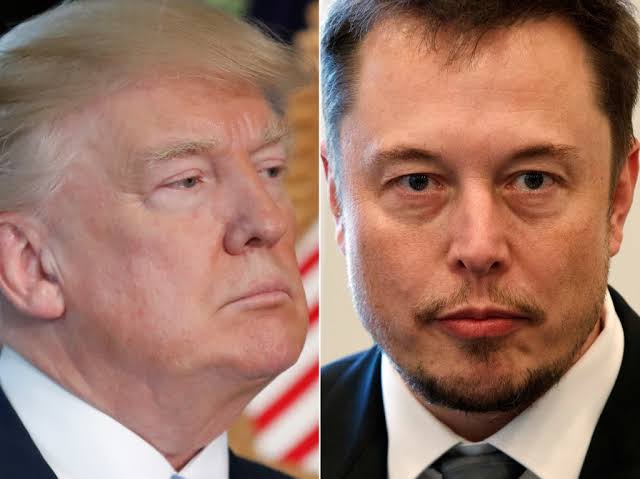
In the unpredictable theatre of politics, where fortunes shift in the blink of an eye, chaos and surprise are the only constant things. This volatile arena is rife with tangled intrigues, ruthless betrayals, and sudden, shattering breakups.
The rapid collapse of the alliance between President Donald Trump and billionaire entrepreneur Elon Musk stands as one of the most astonishing developments of the century, leaving even the most seasoned analysts utterly astounded.
In less than 48 hours, their relationship has gone from mutual admiration to public hostility, leaving both Washington and Wall Street reeling.
For years, Musk was not just a donor but a confidant, serving as a White House adviser and pouring millions into Trump’s campaign coffers.
The two men, both known for their brash styles and love of social media spectacle, seemed to thrive on their shared outsider status. That era is now over, and the split is as personal as it is political.
The immediate cause of the rupture was Trump’s flagship tax and spending proposal, dubbed the “Big Beautiful Bill.” Musk, who once led the Department of Government Efficiency, had already voiced concerns that the bill would balloon the national deficit and undo his own efforts to rein in federal spending. But when Musk took to his platform X to call the bill a “disgusting abomination,” the gloves came off.
Trump, who was initially silent, soon made his disappointment public. In an Oval Office session, he criticized Musk, and the two began trading barbs on their respective platforms—Trump on Truth Social, Musk on X. The spat quickly escalated beyond policy, with Trump threatening to terminate government contracts with Musk’s companies, including Tesla and SpaceX.
As expected, the market reaction was swift and brutal. Tesla shares plunged more than 14% in a single day, wiping out $150 billion in market value—the largest one-day loss in the company’s history. Investors, already jittery over political uncertainty, saw the feud as a sign of deeper instability.
Musk, never one to back down, responded with his own threats. He briefly suggested that SpaceX might decommission its Dragon spacecraft, jeopardizing America’s only means of transporting astronauts to the International Space Station. Though he later walked back the threat, the message was clear: Musk would not be cowed.
The personal animosity soon spilled into public view. Trump, in an interview with NBC News, declared the relationship finished. “I would assume so, yeah,” he said when asked if the bond was broken, adding that Musk had been “very disrespectful” and that he had no intention of speaking with him again.
Even Vice President JD Vance and other Republican leaders quickly closed ranks around Trump. Vance, in a podcast interview, said Musk’s confrontation was a “big mistake” and signaled that the billionaire might not be welcomed back into the fold. The message from the GOP was unmistakable: loyalty to Trump is non-negotiable.
Trump’s warnings grew sharper. He threatened “very serious consequences” if Musk used his vast wealth to fund challengers to Republicans who supported the president’s legislative agenda. The president hinted at reviewing—and possibly revoking—the billions in government subsidies and contracts that have fueled Musk’s business empire.
Musk, on his part, deleted some of his more incendiary posts, including a claim that Trump was named in the so-called “Epstein Files.” But the damage was done. Even after aides for both men reportedly brokered a fragile truce, the underlying animosity remained.
The implications of this feud extend far beyond the two men. Musk’s financial support has been critical for Republicans, and his influence in Silicon Valley is unmatched. A prolonged conflict could erode GOP support among tech leaders and threaten the party’s hold on Congress in next year’s midterms.
Also, the public nature of the split—fueled by social media sniping and threats—has rattled markets and raised questions about the stability of both Trump’s administration and Musk’s business ventures. The spectacle has also highlighted the risks of tying political fortunes to volatile personalities.
What is obvious is that both Trump and Musk are combative, unpredictable, and fiercely protective of their personal brands. Their alliance has been a marriage of convenience, destined to end when their interests clashed.
Yet the speed and ferocity of the breakup underscore the precariousness of power in today’s political landscape. In less than two days, a partnership that once seemed unbreakable has dissolved into acrimony, threats, and mutual recrimination.
As it is going, there are no plans for reconciliation. Trump has made it clear: “No intention” of speaking to Musk, no hope of repairing the relationship. For Musk, the path forward may involve new political alliances—or a retreat from the political arena altogether.
One thing is certain: The Trump-Musk bromance is over, but their intertwined political and business interests ensure the fallout will be complex and far-reaching. With Musk’s substantial campaign contributions and government contracts at stake, and Trump’s readiness to wield political power as retaliation, both men remain locked in a high-stakes battle that could reshape Republican politics and the future of Musk’s corporate empire.
As this bitter split unfolds, it serves as a stark reminder that alliances built on convenience and ego can implode quickly—and when they do, the consequences ripple well beyond the principals involved, affecting industries, investors, and the political landscape alike.